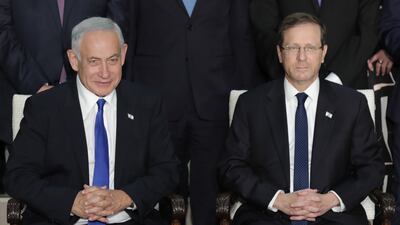Israel is facing a “historic constitutional crisis”, President Isaac Herzog has warned as the new government prepares to introduce sweeping judicial reforms granting the cabinet more sway over the country's top court.
“We are in the grips of a profound disagreement that is tearing our nation apart. This conflict worries me deeply, as it worries many across Israel and the [Jewish] Diaspora,” Mr Herzog said in a statement on Sunday.
“I am now focused on two critical roles that I believe I bear as President at this hour: averting a historic constitutional crisis and stopping the continued rift within our nation.”
His comments came a day after tens of thousands of people protested against Prime Minister Benjamin Netanyahu's government across Israel.
At least 70,000 took to the streets in Tel Aviv, police estimated, in a city known for its largely secular and liberal majority. Demonstrations were also held in the northern coastal city of Haifa, which is home to a large Arab minority.
Mr Netanyahu secured a sixth term in office after his party won the most seats in November elections and formed a coalition with Ultra-Orthodox and far-right groups whose members in his cabinet have threatened to radically overhaul both Israel's laws and disrupt restive peace with the Palestinians.
Earlier this month, National Security Minister Itamar Ben-Gvir visited the Al Aqsa Mosque compound, prompting outrage from the international community, including Jordan, which has warned it is “prepared for conflict” if any changes are made to the status quo of the city's holy sites under its custodianship.
The new government has pledged to expand settlements in the occupied West Bank, increase Orthodox influence on secular society and, under reforms proposed by Justice Minister Yariv Levin, restrict the power of the Supreme Court.
Under the proposed reforms, the top court would have no power to nullify amendments made by the Knesset to Israel's “basic laws” which act in place of a constitution.
Mr Netanyahu will also reorder judge selection panels to give his cabinet more sway over appointments to the court, while also raising the threshold to vote down other laws passed by parliament.
The proposals have been blasted by former prime minister Yair Lapid as “radical regime change” while the head of the Supreme Court court said such rules would “crush” the justice system.
“We will complete the reform legislation that will fix what needs fixing, will fully protect individual rights and will restore the public's trust in the justice system,” Mr Netanyahu said in a cabinet briefing on Sunday.
Mr Lapid, leader of the opposition, called for a referendum on the matter, saying: “It would be reasonable to go and consult with the people before deciding to turn democratic Israel into non-democratic, no?”

